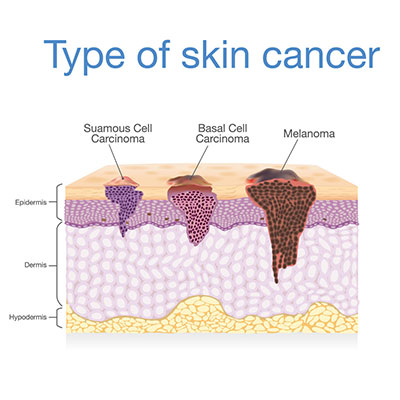Skin cancer

Overview
Skin cancer is the rapid growth of abnormal skin cells. The most common cause of skin cancer is over-exposure to ultraviolet (UV) light radiation of the sun, but this is not always the case. Melanoma skin cancer is the most serious type of skin cancer, as it can spread rapidly and infect other organs and tissue.
The three main types of skin cancer are:
- Basal Cell Carcinoma: the most common type of skin cancer in the world. This type of cancer starts at the basal cells and usually occurs in areas that are exposed to UV light.
- Squamous Cell Carcinoma: This is the type of cancer that starts at the squamous cells. The most common cause is over-exposure to UV light.
- Melanoma – the most invasive type of skin cancer. It starts at the melanocytes (cells that produce melanin). This type of skin cancer could spread to other organs of the body if left untreated.
Avoiding or reducing the over-exposure to UV light can help reduce the risk of developing skin cancer. Sunscreen can also help protect the skin. Skin cancer is most likely to be treated successfully when diagnosed at an early stage.
Skin Cancer Symptoms
Signs and symptoms of skin cancer
- Basal Cell Carcinoma mostly occurs on areas of the skin that are exposed to UV light, such as the head, neck, arms, hands, and legs.
Basal cell carcinoma signs include:- Shiny pearl-like or waxy bumps.
- Skin-colored or brown scar-like lesions.
- White, waxy, scar-like lesions without clear borders.
- Bleeding or scabbing sores that do not heal.
- Squamous Cell Carcinoma is mostly seen in sun-exposed areas such as the face, ears, and hands. Darker-skinned people are more likely to be affected by squamous cell carcinoma even if those areas are not over-exposed to UV light.
Squamous cell carcinoma signs include:- Firm, red nodules.
- Flat, scaly lesions.
- Melanoma can develop on any area of the body, including areas that are not usually exposed to UV light.
Melanoma signs include:- Brownish spots with a darker patch.
- Lesions that are painful, itchy, or burning.
- Changes to a mole in color or size, or moles that begin to bleed.
If you notice any changes to the skin, and any signs and symptoms indicating skin cancer, please make an appointment with your doctor.
Skin Cancer Causes
Skin cancer occurs when there is a change of DNA in the skin cells. The most common cause of skin cancer is over-exposure to UV light. Tanning beds also damage the DNA of skin cells. This causes the abnormal growth of cells that could form into a mass of cancer cells. Exposure to toxic substances or having a weakened immune system can also contribute to the risk.
Risk factors
Factors that may increase the risk of skin cancer include:
- Family history – It is highly possible to develop skin cancer if there is a history of cancer in one of your parents or a sibling.
- Overexposure to UV light – people who are overexposed to UV light (working or playing) may develop skin cancer. It’s more likely if the person isn’t protected by sunscreen. Excessive usage of tanning beds may also put the person at risk.
- History of sunburn – people who have a history of easily sunburnt skin and blisters from sunburn are at an increased risk of developing skin cancer.
- Tropical or High-altitude climate – people who live in higher ambient temperatures and those who are exposed to UV light are more likely to develop skin cancer.
- Skin color – anyone can get cancer regardless of the skin color. However, fair skin provides minimal protection from UV light, and fair-skinned people are more likely to be at risk of skin cancer.
- Moles – anyone who has moles or abnormal moles named dysplastic nevi have an increased risk to developing skin cancer. Irregular shaped moles are larger than normal moles, and should be assessed by a doctor, especially if the mole is bleeding.
- Weak immune system – people who have a weak immune system or are taking immunosuppressant drugs could be at risk.
If you notice any changes to your skin including discolored spots, bleeding or lesions, make an appointment at the Life Cancer Center at Vejthani Hospital for a thorough examination.



